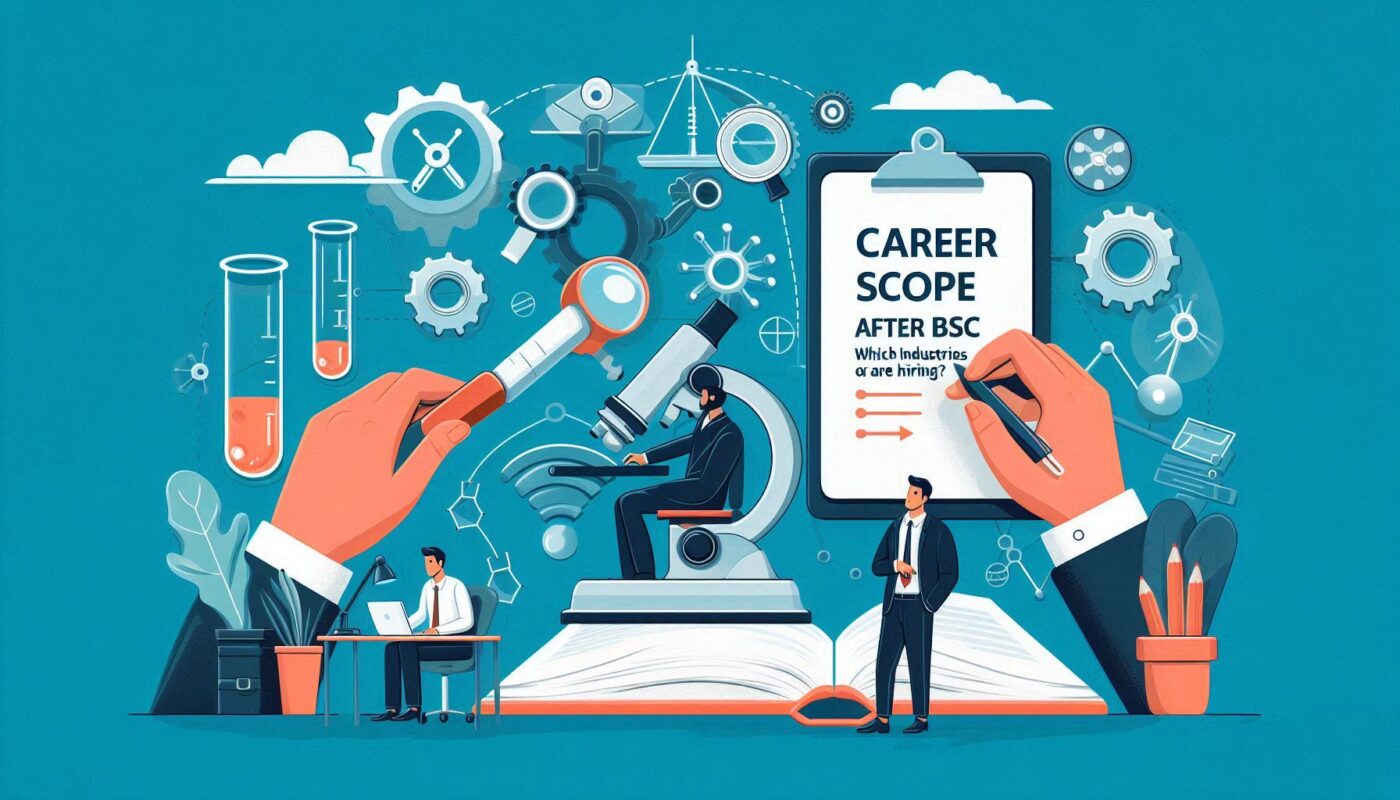Completing a BSc degree opens up numerous possibilities across diverse fields. With the rapid advancement in technology and research, BSc graduates are in high demand in several industries, from healthcare and pharmaceuticals to technology and environmental science. If you’re wondering what career options you have after a BSc degree, this article explores the potential industries, top roles, and how you can make the most of your qualifications to build a rewarding career.
Why Choose a BSc Degree?
A BSc degree is a strong foundation for a career in science and technology. Unlike general degrees, a BSc program equips students with specialized skills in scientific disciplines like biology, chemistry, physics, computer science, and environmental science. These skills are highly applicable in practical and research-driven fields, making BSc graduates ideal candidates for roles requiring analytical, technical, and problem-solving capabilities.
Popular Industries Hiring BSc Graduates
While a BSc degree covers multiple specializations, certain industries stand out for their hiring demand. Here’s a look at some of the top industries actively hiring BSc graduates:
1. Healthcare and Life Sciences
The healthcare industry is one of the biggest employers of BSc graduates, especially for those who majored in life sciences, biology, or microbiology. The career possibilities here include:
- Medical Laboratory Technician: Responsible for conducting lab tests and supporting doctors in diagnosing and treating patients.
- Clinical Research Coordinator: Oversees clinical trials, ensuring data accuracy and compliance with research guidelines.
- Pharmaceutical Sales Representative: Promotes and sells pharmaceutical products to healthcare providers, requiring a solid understanding of medical science.
2. Pharmaceutical Industry
With a BSc degree in chemistry, biochemistry, or pharmacology, graduates can enter the pharmaceutical industry, a rapidly growing field. This industry offers roles such as:
- Quality Control Analyst: Ensures that products meet safety and efficacy standards before reaching the market.
- Research Scientist: Conducts experiments and develops new drugs, aiming to improve healthcare solutions.
- Pharmacovigilance Officer: Monitors the effects of drugs and ensures they are safe for public use.
3. Information Technology (IT)
The IT industry offers a plethora of opportunities for BSc graduates with a background in computer science or information technology. Key roles include:
- Software Developer: Develops software applications, ensuring they meet user requirements and function seamlessly.
- Data Analyst: Analyzes and interprets data to help companies make informed business decisions.
- Cybersecurity Analyst: Protects an organization’s data and systems from security breaches and cyberattacks.
Top Career Paths for BSc Graduates in Key Industries
1. Environmental Science and Conservation
With increasing global awareness of environmental sustainability, environmental science has become a highly valued field. BSc graduates specializing in environmental science, ecology, or related fields can pursue roles such as:
- Environmental Consultant: Advises businesses on minimizing environmental impact and complying with regulations.
- Wildlife Biologist: Studies and protects wildlife and natural habitats, often working with conservation organizations.
- Environmental Analyst: Conducts environmental assessments and helps implement eco-friendly initiatives.
2. Research and Development (R&D)
Research and Development is a field that demands a strong background in scientific research and analytical skills. BSc graduates in chemistry, physics, or biology can find roles in R&D, including:
- Research Scientist: Conducts experiments and contributes to scientific knowledge, often working in labs or academic institutions.
- Product Development Scientist: Works in industries like food, cosmetics, and pharmaceuticals, developing and improving products.
- Lab Technician: Supports R&D activities by preparing samples, conducting tests, and recording results.
3. Agriculture and Food Science
The agriculture and food science industry is another vital area for BSc graduates, especially those with degrees in agricultural science, biotechnology, or food science. Some career options here include:
- Agronomist: Studies crop production, soil management, and sustainable farming techniques.
- Food Technologist: Ensures that food products are safe, high-quality, and comply with regulatory standards.
- Biotechnology Technician: Works on developing genetically modified organisms (GMOs) and other agricultural innovations.
Skills Required to Succeed After a BSc Degree
A BSc degree equips graduates with many transferable skills that are highly valued in different industries. Here are some key skills that enhance employability:
- Analytical Skills: Ability to assess complex problems and derive insights is crucial in fields like IT, research, and data analysis.
- Technical Proficiency: BSc graduates often have hands-on experience with laboratory techniques, scientific tools, or software, making them valuable in tech and lab-based industries.
- Research Skills: BSc students learn how to conduct experiments, gather and analyze data, and interpret results, which is essential in R&D.
- Communication Skills: The ability to explain scientific concepts in a clear, concise manner is important, especially for roles in education, sales, or consulting.
Further Studies and Certifications After a BSc Degree
To gain a competitive edge, many BSc graduates pursue further studies or certifications. Here are some paths to consider:
- Master’s Degree (MSc): Pursuing an MSc allows students to specialize further in their field and opens doors to advanced positions, such as research scientist or academic roles.
- MBA (Master of Business Administration): For those interested in management or entrepreneurship, an MBA can provide essential business skills and help secure managerial roles.
- Professional Certifications: Certifications in fields like data science, project management, or laboratory technology can enhance employability, especially in tech-driven roles.
- Diploma Programs: Short-term diploma courses in fields like bioinformatics, environmental science, or healthcare management add skills that can be applied directly in the workplace.
Frequently Asked Questions (FAQs)
- What is the full form of BSc?
- The full form of BSc is Bachelor of Science, an undergraduate degree focused on science and technology-related fields.
- Can I pursue an MBA after completing a BSc degree?
- Yes, an MBA is a popular choice for BSc graduates looking to enter managerial roles or start their own businesses.
- What industries have the highest demand for BSc graduates?
- Industries such as healthcare, pharmaceuticals, IT, environmental science, and agriculture have high demand for BSc graduates.
- Is research a viable career option after a BSc degree?
- Yes, research is a strong career path for BSc graduates, especially for those who wish to contribute to scientific knowledge or work in R&D.
- How does a BSc degree differ from a Bachelor of Arts (BA)?
- A BSc focuses on science and technical subjects, while a BA is generally oriented towards humanities and social sciences.
Conclusion
A BSc degree is more than just an academic qualification; it’s a gateway to a wide range of industries that value scientific and technical knowledge. From healthcare and IT to environmental science and agriculture, BSc graduates have countless opportunities to build a fulfilling and impactful career. Whether you’re considering entry-level positions or planning further studies, the options are vast and varied. For those looking to explore more academic or career options, Universitychalo is an excellent resource to guide you on the next steps in your academic journey.
With the right mix of skills, further education, and a passion for science, BSc graduates are well-positioned to succeed in today’s evolving job market.



